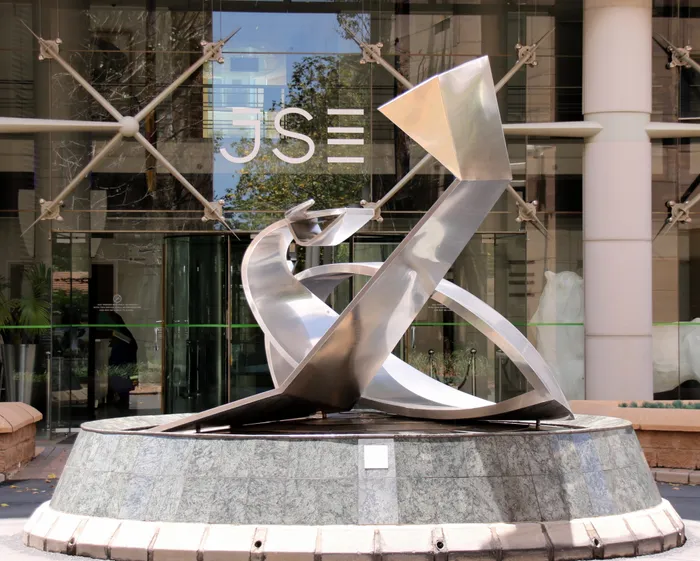
The All Share index on the JSE once again recorded a record level high on Friday.
Image: Nicola Mawson / Independent Newspapers
The All Share index on the JSE once again recorded a record level high on Friday. The index closed on 102 274 points on Friday. This represents a weekly increase of 774 points, or 0.8%. The index is now up by 2.4% over the last month and 9.3% over the last quarter. Since the beginning of the year All Share index has gained 22.0%. The main reasons are the more positive global sentiment that better trade agreements between the US and most of the developed world countries are envisaged, a possibility that there will be an end of the Russia and Ukraine conflict, a stronger and stable Rand exchange rate, lower oil prices, lower interest rates and the ongoing surges in precious metal prices.
The Gold prices had advanced by $42 per ounce last week ($3 377), which amounts to a 22.9% surge since the beginning of the year. The Platinum price increased $34 per ounce in the last five days and improved by 25.0% over the last three months. Palladium shot up by $30 last week, moving higher by 9.0% over the last quarter.
The speech on Friday by Federal Reserve chairperson, Jeremy Powell, at the annual US Economic Policy Symposium in Jackson Hole, where he has indicated that there is now a greater possibility for US interest rates to be cut at Fed’s next meeting in September, boosted equity prices throughout the world. He directed that US economic growth had slowed, and unemployment is on the rise that warrants a rate cut. (One, however, must ask if he is not giving under pressure after a rate cut was urged by US President Donald Trump). At Wall Street, US equity prices soared after the speech. S&P500 shot up on Friday with 1.52% to end the week 0.5% higher. The Dow Jones on Friday advanced by 1.9%, gaining 1.5% last week.
Financial shares and the Rand improved noticeably.
The stronger Rand exchange rate, the stimulated effect on credit demand from the public and the expectations of a US rate cut, pushed financial shares to higher levels last week. The FIN 15 index gained 1.6% last week and is now 3.3% higher over the last month, advancing 6.06% over the last three months. The Rand improved last week, especially on Friday. Against the US dollar the currency appreciated on Friday alone by 30 cents to close at its strongest level this year at R17.45/$. The concerns on US growth, weaker employment and the backlash of higher tariffs on US consumption, saw the dollar weakening against most currencies. The strong hike in precious metal prices and the undervalued currency over the last year also boosted the Rand last week. Positive sentiment on a possible new inflation target of 3.0% also boosted the currency. Against the UK Pound the Rand gained 21 cents last week to close on Friday at R23.61, the strongest level in the last three months. Against the Euro (€) the currency improved last week with 13C at R20.44/ €.
South Africa’s geopolitical landscape
There is currently no relationship between the performance of the financial markets in South Africa and geo-political issues. The geopolitical landscape is globally influenced by economic instability, due to uncertainty on the effect of US trade tariffs and their impact on exports, the ongoing conflicts between Russia and Ukraine, the Middle East uncertainty on the Gaza conflict and the US-Israel-Iran conflict.
Domestically, challenges include increased unemployment, rising social unrest, and ongoing efforts to improve infrastructure and address xenophobia. The change in public opinion against the current insecure actions by the President against state capture, several ministers and the controversial visit of the SANDF chief, General Rudzani Maphwanya’s trip to Iran that put existing strain in South Africa's relationship with the US also plays a role towards the negative geopolitical landscape. This only within a month after the introduction of a 30% tariff policy against South Africa and the “scrapping” of support of the US for South African exporters in terms of the Agoa agreement.
Prospects for this coming week
On global financial markets investors, economists and analysts awaits the release of the US economic growth data for quarter two 2025. After a negative -0.3% (year-on-year) rate in quarter one, it is expected an much improvement to 3.0% in quarter two. The announcement of the latest US durable orders data, and personal income and spending figures will also set the trend for market sentiment. Domestically investors await the release by the Reserve Bank of South Africa’s leading business cycle indicator, the Production Inflation Index (PPI) for July by Statistics South Africa and the country’s trade balance for July.

Chris Harmse is the consulting economist of Sequoia Capital Management and a senior lecturer at Stadio Higher Education.
Image: Supplied
Chris Harmse is the consulting economist of Sequoia Capital Management and a senior lecturer at Stadio Higher Education.
*** The views expressed here do not necessarily represent those of Independent Media or IOL
BUSINESS REPORT